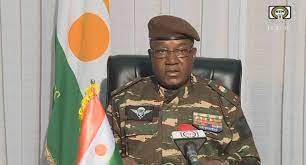The military-led governments of Burkina Faso and Mali issued a strong warning on Monday, stating that any potential military intervention in Niger aimed at restoring deposed President Mohamed Bazoum would be considered a “declaration of war” against both their countries.
This warning comes in the aftermath of West African leaders, backed by their Western allies, threatening to employ “force” to reinstate President Bazoum, who was democratically elected. The putschists responsible for the coup have also faced financial sanctions as a consequence.
In a joint statement, the governments of Burkina Faso and Mali emphasized that any military intervention against Niger would carry severe repercussions and could result in destabilizing the entire region. They urged for a peaceful and diplomatic resolution to the situation, highlighting the potential disastrous consequences of resorting to military action.
The two individuals further expressed their firm stance of non-compliance with the “illegal, illegitimate, and inhumane sanctions imposed on the people and authorities of Niger.”
During an urgent summit on Sunday, the Economic Community of West African States (ECOWAS) issued a demand for the prompt reinstatement of Bazoum within a week. Failure to comply would result in the adoption of “necessary actions” to ensure the restoration of constitutional order.
The statement made clear that these actions could encompass the potential use of force to achieve this objective.
The bloc has imposed financial sanctions on the junta leaders and Niger, one of the world’s poorest nations, by freezing all commercial and financial transactions between member states. This move comes as pressure mounts from Western and African partners to prompt a quick restoration of constitutional order after the July 26 coup. Niger’s strategic importance in the fight against jihadist groups in the Sahel region has led France and the United States to deploy 2,600 soldiers to assist in combating these extremists.
The situation in Niger is considered extremely dangerous, and the junta’s accusation that France is trying to intervene militarily to reinstate Bazoum has been denied by French Foreign Minister Catherine Colonna. She refuted the allegation, stating that it was still possible to restore the president to power. Colonna emphasized the necessity of stability for Niger and its neighboring countries.
French President Emmanuel Macron has made a strong commitment to take “immediate and uncompromising” action in response to any attacks on French citizens or interests. His statement came after thousands of people rallied outside the French embassy in Niamey, with some attempting to enter the compound but being dispersed by tear gas.
According to Colonna, the demonstration was not spontaneous but rather organized and violent, posing a significant threat with the presence of Molotov cocktails and Russian flags. Anti-French slogans used in the protest were also noted as being similar to those heard elsewhere.
In light of the situation, Russia has called for the restoration of “the rule of law” and urged all parties to show restraint in Niger.
President Macron has been in contact with Bazoum, the leader of Niger, as well as other regional leaders, as reported by the presidential palace in Paris.
It’s important to note that Bazoum, a Western ally whose election took place just over two years ago, represented Niger’s first peaceful transition of power since gaining independence from France in 1960. However, on July 26, he was toppled by the elite Presidential Guard.
Guards chief General Abdourahamane Tiani declared himself the leader, but his claim has been rejected internationally, and ECOWAS has given him a week to hand back power.
Bazoum stands as one of the few remaining elected presidents and pro-Western leaders in the Sahel. Since 2020, the region has been grappling with a jihadist insurgency, which has also led to coups in Mali and Burkina Faso.
Bazoum’s PNDS party on Monday expressed concern that Niger risked transitioning into a “dictatorial and totalitarian regime” in light of recent arrests.
According to the party, the country’s oil minister, mining minister, and the head of the PNDS’s national executive committee were arrested that morning. The junta had also previously detained the interior and transport ministers, along with a former defense minister.
The European Union condemned the arrest of ministers from the deposed government and demanded their immediate release.
Niger, a landlocked country, has become the third Sahel nation in less than three years, following Mali and Burkina Faso, to experience a military coup. These countries have all faced challenges due to a jihadist insurgency, which has strained their fragile governments, fueled discontent within the military, and caused severe economic hardships in some of the world’s poorest nations.




